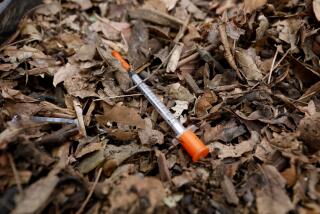Clean Needle Programs Curb AIDS, Study Says
- Share via
SAN FRANCISCO — Programs that supply sterile needles to drug addicts protect them and their families from infection with the AIDS virus and should be part of a broad assault on the deadly disease, a team of researchers said in a federally funded study released here Thursday.
The 18-month study offers the most comprehensive look to date at needle-exchange programs, which allow addicts to trade their used syringes for clean ones, thus reducing the possibility that contaminated needles will be shared and that the HIV infection will spread.
Sponsored by the U.S. Centers for Disease Control and Prevention, the study reviewed the 37 needle-exchange programs operating in the United States and others in Canada and Europe, where the tactic is more widely accepted.
Their most important conclusion, the scientists said, is that such programs are preventing HIV infections in drug users, their sex partners and their children. They based that conclusion on several factors, including evidence of changed behavior of addicts who previously shared needles and a reduced incidence among drug users of hepatitis B, which, like HIV, may be transmitted through contaminated syringes.
The researchers acknowledged, however, that it has so far been impossible to statistically prove their widely shared belief that needle exchanges reduce the HIV infection rate.
In another key finding, the scientists said there was no evidence that distributing needles leads to an increase in drug use--an argument voiced by critics. Instead, some needle-exchange programs refer addicts to treatment centers, creating the possibility that some users will get off drugs, said Dr. Peter Lurie of UC San Francisco’s Institute for Health Policy Studies.
“Getting a clean syringe into the hands of a drug user--and getting contaminated syringes out of circulation--can prevent HIV infection among users,” said Lurie, who led a 12-member research group along with Dr. Arthur L. Reingold of UC Berkeley’s School of Public Health. “Our research confirms what should have been obvious all along.”
Intravenous drug users, estimated at 1.5 million in the United States, are the second-largest group at risk for AIDS, after homosexual men. Addicts are the leading source of HIV infection among heterosexuals, women and children. Of the 315,390 AIDS cases recorded in the country as of June, one-third occurred in drug users, their sex partners and their children.
The first needle-exchange program was established in Amsterdam in 1984. In 1988, Tacoma, Wash., launched the first effort in the United States. The programs have proliferated quickly; last year, the UC researchers said, 2.4 million syringes were distributed in the United States, mostly on street corners or at storefronts, but in some cases to addicts’ homes.
Thursday’s recommendation by the scientists adds to a growing chorus of support for the needle-exchange concept. In 1991, it was advocated by the National Commission on AIDS, and in June the World Health Organization’s AIDS director endorsed it at the international AIDS meeting in Berlin.
In California and 10 other states, however, only pharmacists have the authority to distribute needles--and then only with a prescription. As a result, most needle-exchange programs in those states operate clandestinely. In some cities, volunteers distributing needles have been arrested.
In unveiling their report, the researchers called for legislative changes to make such programs more numerous and effective. Specifically, Lurie urged that a ban on federal funds for needle exchanges be lifted and asked Gov. Pete Wilson to sign a bill now on his desk that would permit California cities and counties to experiment with needle-swapping.
Last year, Wilson vetoed a similar bill, citing a lack of scientific evidence that such programs work and concerns that giving away needles undermines anti-drug messages. J. P. Tremblay, a Wilson spokesman, said the governor “welcomes the new study” and will consider it before making a decision on the bill.
Renee Edgington, director of Clean Needles Now in Los Angeles, applauded the study and expressed hope that it will pressure the governor to sign the bill. Clean Needles Now says it uses volunteers to distribute about 2,500 syringes weekly, but it must operate underground.
By contrast, San Francisco’s Prevention Point enjoys the blessing of the mayor, Frank Jordan, and even city funds. In March, Jordan decided to flout state law and help the program, which distributes 24,000 needles a week and serves an estimated 20% of the city’s addicts.





